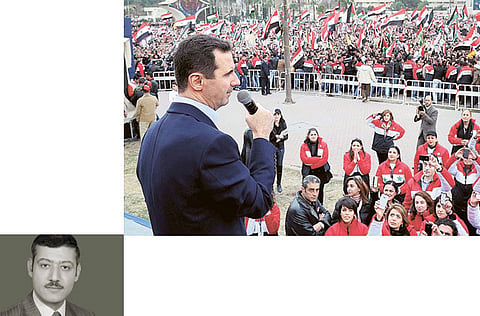Russia defending interests in Mideast
Should the Al Assad regime fall, Turkey is set to benefit the most. For Moscow, this will change the balance of power from central Asia to Middle East

For the second time in four months, Russia seems to be inclined to veto a UN Security Council resolution that condemns the Syrian regime's approach in dealing with the protest movement. In early October, Moscow torpedoed an attempt to castigate the Syrian government for committing flagrant human rights violations and crimes against humanity. Russia's stiff resistance to take any sort of action against Damascus is perplexing for many observers. The ambiguous motives behind the Russian position are the key factors behind the confusion.
During the Cold War era, for example, Russia's support for Syria was easy to understand. It was almost exclusively driven by the great rivalry with the US and involved recognisable national interests. Under the bipolar mantle of the Cold War, both the USSR and the US sought regional clients to enhance their position vis-a-vis the other in a struggle for world-wide supremacy.
In such a climate, the fall of a client state was considered a setback for the patron. The motives behind the current Russian position, by contrast, are particularly unclear and as a consequence analysts seem to be wavering when asked to explain the Russian policy. Although the Cold War ended more than two decades ago and the situation has since fundamentally changed, most analysts tend to explain the Russian position on the Syrian crisis in historic perspective and as a consequence predict a return of the Cold War divide.
Internal opposition
In fact, except for its nuclear arsenal and a permanent membership in the Council, Russia lacks today some of the key characteristic of a superpower. Its GDP, for example, is only one tenth of that of the US — $14.5 trillion (Dh53.22 trillion). It lags far behind China too — the second largest world economy with a GDP of around $5.8 trillion. Russia's population is also shrinking. When the Cold War ended in 1991, Russia's population was 163 million. Today it is approximately 147 million and is set to further decline. Having said that; Russia's support of the Syrian regime must be seen as defensive rather than aggressive policy. Russia's position on the Syrian crisis has two aspects: domestic and external.
Domestically, the Russian government fears the fast-growing internal opposition movement since the early December parliamentary elections, which was marred by fraud and ballot stuffing. Prime Minister Vladimir Putin, who is seeking a return to the presidency next month, seems to be convinced that any popular protest in any part of the world, and especially in the Middle East, is supported by the US; it will have a domino effect and it will hence be inspiring for his internal opposition. The closer he, therefore, gets to the March election, the more resistance he will produce to prevent a victory by the opposition in Syria. Here, Putin is in fact defending himself not the Syrian regime.
Externally, ever since the collapse of the Soviet Union, Moscow has been struggling to prevent the US from penetrating into its strategic belt in Caucasia and Central Asia. Although Moscow has retained its influence over most of the former Soviet republics which have formerly been lost to the US, Russia remains absolutely irritated by Nato's expansion into most of Eastern Europe and Russia's western frontiers. The deployment of the US defence shield in Eastern Europe and Turkey is also a matter of great concern. Opposing western policies on Syria is a means to complain against western meddling in Russia's strategic sphere and for ignoring its national interests in many other parts of the world, more recently in Libya.
Finally, Russia seems to be concerned about the rise of Turkey's influence in the Middle East, the Balkans, Central Asia and Caucasia. With one third of its population being Muslims, Russia views Turkey's policies, especially under the Islamically-oriented government of the AKP, with great suspicion. Turkey is marketing itself as model of liberal Islam in the Islamic world and with the ascendance of Islamist forces in all of the Arab countries which have so far witnessed change; Turkey is acting or presenting itself as a mentor for these forces.
Bearing in mind the centuries-old historic animosity between the Sunni Muslim Ottoman Empire and Christian Russia, Moscow is absolutely alarmed by the rise of Turkey and its interpretation of Islam. Should the Syrian regime fall too, Turkey, which has openly supported the opposition, is set to benefit the most. For Moscow, this will fundamentally change the balance of power in a region that stretches from central Asia to the Middle East and from the Balkans and Caucasia to the Gulf. With Iran's position weakening too, Russia, which attempts to present itself as a moderator between Tehran and the West, will also become irrelevant. Russia's new assertiveness must hence be understood within this context and its support for the Syrian regime is in fact more about defending its own interests rather than those of Damascus.
Dr Marwan Kabalan is the Dean of the Faculty of International Relations and Diplomacy, Kalamoon University, Damascus, Syria.


